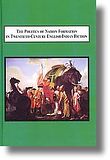The Politics of Nation Formation
Maxharraj, Uke:
The politics of nation formation in twentieth-century English-Indian fiction : Kipling, Forster, Rao, Narayan, Anand, and Rushdie / Ukë Maxharraj ; with a foreword by Mohit K. Ray. - Lewiston, N.Y. : Edwin Mellen Press, 2011. - v, 379 S.
ISBN 978-0-7734-1502-7 / 0-7734-1502-5
US$ 129,95 / £ 79,95
DDC: 823.9109358
Beschreibung
This book argues that the question of nation formation does not end with the finalization of independence. This work analyzes questions of aggressive and defensive nationalism, religion, language and the fate of the nation after independence. The book addresses the intersection of politics and fiction in the process of nation formation in English-Indian fiction during the twentieth century. It does this by explaining the position of a writer in the process of decolonization. The central question of this project is the construction in fiction, of political developments during the processes of nation formation in India, and how an English-Indian novelist reflects upon these issues. The conflict between colonizers and colonized in India has produced two extremes; the colonial aggressive stance and the native defensive position of fighting against colonial rule. The author has elaborated his argument on these questions in the form of aggressive nationalism and defensive nationalism. While discussing anti-colonial nationalism in India, it was relevant to my argument to address the construction of Gandhian nationalistic thought in fiction. Other significant questions raised include the issues of religion and language. Both these issues demonstrate important internal themes of a colonized society such as India. The final central question is the fate and development of a nation after independence.
Inhalt
Foreword by Mohit K. Ray, Ph.D. i
Acknowledgements. v
Introduction. 1
1. Aggressive Nationalism in Rudyard Kipling's Kim and E.M. Forster's A Passage to India. 23
1. What is Aggressive Nationalism? 23
2. Rudyard Kipling's Imperial Stance of Seeing the White Man as a Colonial Ruler. 32
3. E.M. Forster's Contradictory Stance Toward the Colonial Rule. 68
4. The Effect of Aggressive Nationalism. 103
2. Defensive Nationalism in Raja Rao's Kanthapura and R.K. Narayan's Waiting for the Mahatma. 107
1. What is Defensive Nationalism? 107
2. The Construction of Gandhian Nationalistic Thought in Fiction. 125
3. Urban and Rural Nationalisms. 174
4. The Natives' Attitude Toward the British. 187
3. The Issues of Religion and Language in Mulk Raj Anand's Untouchable. 201
1. The Role of Religion in the Process of Nation Formation. 201
2. The Merciless Form of Religion Fictionalized in Anand's Untouchable. 212
3. The Role of Language in the Process of Nation Formation. 242
4. Anand's Writing of Untouchable in a Language that was not his Own. 258
4. The Obstacles of the New Nation in Salman Rushdie's Midnight's Children. 277
1. Is the Process of Nation Formation Fully Accomplished with Independence? 277
2. The Consequences of Nationalism in Rushdie's Midnight's Children. 287
3. The Irresponsibility of Political Leaders as a Threat to the Nation. 315
4. Rushdie's Vision of How the Nation Could be Stable and Prosperous. 336
Conclusion. 343
Bibliography. 361
Index. 371
About the Author. 379
Autor
UKE MAXHARRAJ received his Ph.D. from the Ludwig Maximilian University.
Quellen: Edwin Mellen Press; Library of Congress; Amazon; WorldCat
Ähnlich
- Dawson Varughese: Reading New India
- Brinks: Anglophone Indian Women Writers
- Shingavi:The Mahatma Misunderstood
- History, Narrative, and Testimony in Amitav Ghosh's Fiction
- Terrorism and Insurgency in Indian-English Literature
- Anglophone Poetry in Colonial India
- Home Fiction
- Tackling the Morality of History
- Voice and Perception in Transcultural Realities
- Indography

